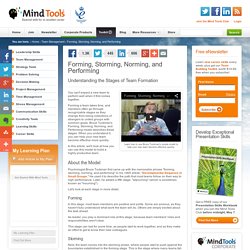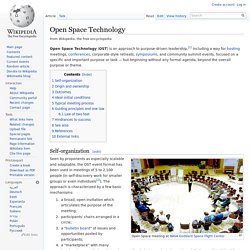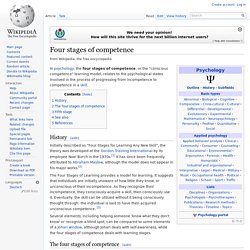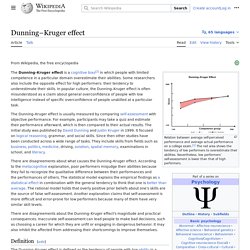

Forming, Storming, Norming and Performing - Leadership skills from MindTools. Understanding the Stages of Team Formation Learn how to use Bruce Tuckman's simple model to help your new team become effective quickly.

You can't expect a new team to perform well when it first comes together. Forming a team takes time, and members often go through recognizable stages as they change from being collections of strangers to united groups with common goals. Bruce Tuckman's Forming, Storming, Norming, and Performing model describes these stages. When you understand it, you can help your new team become effective more quickly. In this article, we'll look at how you can use this model to build a highly productive team. About the Model Psychologist Bruce Tuckman first came up with the memorable phrase "forming, storming, norming, and performing" in his 1965 article, "Developmental Sequence in Small Groups.
" Let's look at each stage in more detail. Forming In this stage, most team members are positive and polite. Storming Storming can also happen in other situations. How Good are Your Motivation Skills? - Team Management Training from MindTools. Discover Key Factors for Building a Motivated Team Motivate your team for real success!

© iStockphoto Managers everywhere want teams that are effective, focused, and committed to organizational goals. With a team like this, just think of the performance and results you could deliver! Teams only perform like this if their managers are motivating them effectively. This is why you need to be able to motivate your team if you want to create a productive work environment. The better you are able to link these factors together, the higher the motivation levels of your team are likely to be. The interactive motivational skills quiz in this article helps you identify the aspects of team motivation that you can improve. Take the test and apply the things you learn from it. Open-space technology. Open Space Technology (OST) is an approach to purpose-driven leadership,[1] including a way for hosting meetings, conferences, corporate-style retreats, symposiums, and community summit events, focused on a specific and important purpose or task — but beginning without any formal agenda, beyond the overall purpose or theme.

Self-organization[edit] Seen by proponents as especially scalable and adaptable, the OST event format has been used in meetings of 5 to 2,100 people (in self-discovery work for smaller groups or even individuals[2]). The approach is characterized by a few basic mechanisms: The approach is most distinctive for its initial lack of an agenda, which sets the stage for the meeting's participants to create the agenda for themselves, in the first 30–90 minutes of the meeting or event. Typically, an "open space" meeting will begin with short introductions by the sponsor and usually a single facilitator. Origin and ownership[edit] Outcomes[edit] Ideal initial conditions[edit]
Four stages of competence. In psychology, the four stages of competence, or the "conscious competence" learning model, relates to the psychological states involved in the process of progressing from incompetence to competence in a skill.

History[edit] The Four Stages of Learning provides a model for learning. It suggests that individuals are initially unaware of how little they know, or unconscious of their incompetence. As they recognize their incompetence, they consciously acquire a skill, then consciously use it. Eventually, the skill can be utilized without it being consciously thought through: the individual is said to have then acquired unconscious competence. [3]
Dunning–Kruger effect. Cognitive bias about one's own skill The Dunning–Kruger effect is a hypothetical cognitive bias stating that people with low ability at a task overestimate their own ability, and that people with high ability at a task underestimate their own ability.

As described by social psychologists David Dunning and Justin Kruger, the bias results from an internal illusion in people of low ability and from an external misperception in people of high ability; that is, "the miscalibration of the incompetent stems from an error about the self, whereas the miscalibration of the highly competent stems from an error about others".[1] It is related to the cognitive bias of illusory superiority and comes from people's inability to recognize their lack of ability.
Without the self-awareness of metacognition, people cannot objectively evaluate their level of competence. Original study[edit] Herzberg's Motivators and Hygiene Factors - Team Management Training from MindTools. Learn How to Motivate Your Team Hygiene factors are not the same as motivators!

© iStockphoto/Feverpitched What do people want from their jobs? Do they want just a higher salary? Or do they want security, good relationships with co-workers, opportunities for growth and advancement – or something else altogether? This is an important question, because it's at the root of motivation, the art of engaging with members of your team in such a way that they give their very best performance.
The psychologist Fredrick Herzberg asked the same question in the 1950s and 60s as a means of understanding employee satisfaction. These results form the basis of Herzberg's Motivation-Hygiene Theory (sometimes known as Herzberg's Two Factor Theory.)